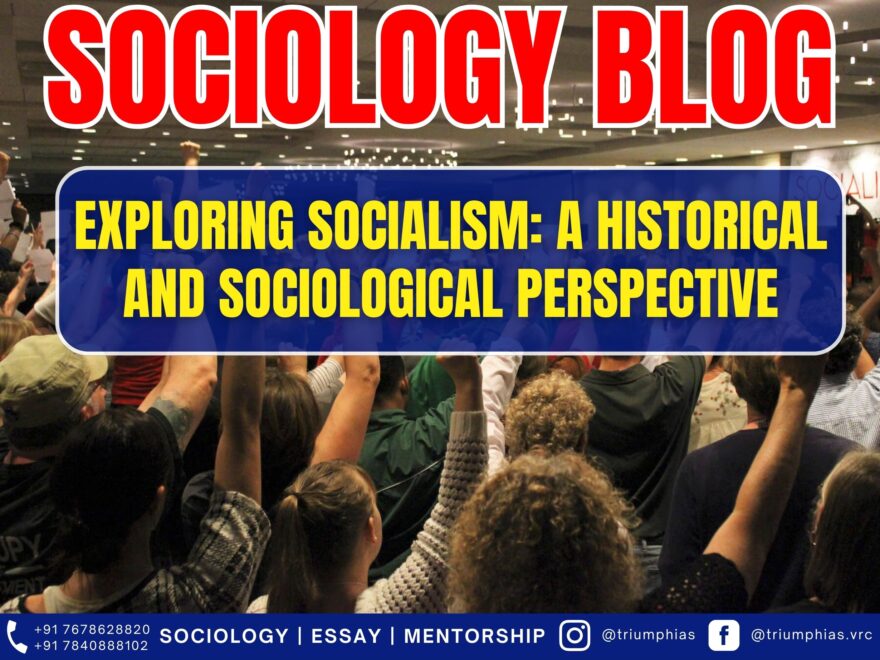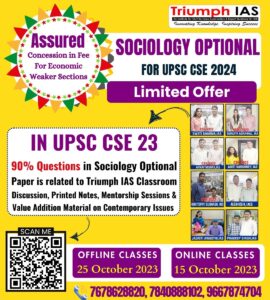Socialism.
Relevant for Sociology Optional for Civil Services Examination.
Paper 1: Unit-4 Sociological Thinkers.
Exploring Socialism: A Historical and Sociological Perspective.
Socialism is a way of organizing society where the government or the people control the means of producing and distributing things, and it stands in contrast to capitalism. Even though the Soviet Union, a key example of a socialist society, fell apart after nearly 200 years, the principles of socialism, like questions about freedom, equality, and rights, are still debated and relevant today. Issues like individual versus group rights and the struggles of ethnic and national minorities have re-emerged especially in Eastern Europe, where capitalism is making a comeback.
Various thinkers viewpoint on socialism:
- Karl Marx’s vision of socialism centered on social ownership of the means of production, abolishing private property, and worker control. He believed socialism, as a transitional stage, would lead to the dictatorship of the proletariat, with the ultimate goal of a stateless, classless communist society marked by equality, abundance, and human liberation through the elimination of capitalism’s exploitation.
- Socialism is often seen as an answer to problems caused by capitalism. Durkheim, thought socialism was about making sure the state and the economy worked closely together to prevent issues like inequality and social disconnection, which can be seen in capitalist societies. But he believed that the aim should be a genuine equal chance for everyone, not enforcing equal outcomes for everyone, which might destroy the foundations of a strong society.
- Max Weber, thought socialism was a way to take capitalism’s emphasis on rational, efficient processes even further. He was sceptical of attempts to mix formal organization and moral or substantial reasoning in a socialist state, fearing it would become a stifling bureaucracy.
- In Britain, a kind of socialism known as “ethical socialism” is focused on gradual, non-revolutionary change and includes strong government involvement in markets and labour, a collective approach to society, and a robust welfare state. This form of socialism, exemplified by the Fabians and outlined in works like “English Ethical Socialism” (1988) by Halsey and Dennis, puts values like liberty, fraternity, and equality at its core, and it has been influential in British sociology and education policy.
- Desai had limitless trust in socialism and believed that it is the panacea to all social problems plaguing capitalism. He maintained that progress could be achieved only by radically transforming the exploitative capitalist system in India.
Location of concept in society:
- Even with these approaches, Karl Marx’s views on socialism and communism have been widely influential, envisioning a society without markets and commodification of labor. But actual socialist states, like the Soviet Union, often deviated significantly from this. What was promised to be a surplus of resources turned out to be scarcity, and instead of providing a strong role for the working class and establishing social justice, socialist societies often failed to create even a functioning meritocracy, and issues like environmental degradation and gender disparities persisted.
- The sudden breakdown of socialist parties in Eastern Europe, even during poverty, possibly suggests a major critique of socialism as it was applied there.
As socialism seems to step back, nationalism and populism are trying to step forward to speak for the political left. So, socialism, in various forms, continues to be a topic of debate and evolution in global discussions on organizing society.
Reference: Static Portion
Related Blogs …
To master these intricacies and fare well in the Sociology Optional Syllabus, aspiring sociologists might benefit from guidance by the Best Sociology Optional Teacher and participation in the Best Sociology Optional Coaching. These avenues provide comprehensive assistance, ensuring a solid understanding of sociology’s diverse methodologies and techniques.
META TAGS:
Socialism, Socialism upsc, Socialism sociology, socialism sociology definition, Sociology, Marxism, Communism, Capitalism, Durkheim, Weber, Ethical Socialism, Karl Marx, Market Socialism, Real Socialism, Political Economy, Sociopolitical Doctrine, Soviet Union, British Socialism, Eastern Europe, Economic Paradigms.
Why Vikash Ranjan’s Classes for Sociology?
Proper guidance and assistance are required to learn the skill of interlinking current happenings with the conventional topics. VIKASH RANJAN SIR at TRIUMPH IAS guides students according to the Recent Trends of UPSC, making him the Best Sociology Teacher for Sociology Optional UPSC.
At Triumph IAS, the Best Sociology Optional Coaching platform, we not only provide the best study material and applied classes for Sociology for IAS but also conduct regular assignments and class tests to assess candidates’ writing skills and understanding of the subject.
Choose The Best Sociology Optional Teacher for IAS Preparation?
At the beginning of the journey for Civil Services Examination preparation, many students face a pivotal decision – selecting their optional subject. Questions such as “which optional subject is the best?” and “which optional subject is the most scoring?” frequently come to mind. Choosing the right optional subject, like choosing the best sociology optional teacher, is a subjective yet vital step that requires a thoughtful decision based on facts. A misstep in this crucial decision can indeed prove disastrous.
Ever since the exam pattern was revamped in 2013, the UPSC has eliminated the need for a second optional subject. Now, candidates have to choose only one optional subject for the UPSC Mains, which has two papers of 250 marks each. One of the compelling choices for many has been the sociology optional. However, it’s strongly advised to decide on your optional subject for mains well ahead of time to get sufficient time to complete the syllabus. After all, most students score similarly in General Studies Papers; it’s the score in the optional subject & essay that contributes significantly to the final selection.
“A sound strategy does not rely solely on the popular
Opinion of toppers or famous YouTubers cum teachers.”
It requires understanding one’s ability, interest, and the relevance of the subject, not just for the exam but also for life in general. Hence, when selecting the best sociology teacher, one must consider the usefulness of sociology optional coaching in General Studies, Essay, and Personality Test.
The choice of the optional subject should be based on objective criteria, such as the nature, scope, and size of the syllabus, uniformity and stability in the question pattern, relevance of the syllabic content in daily life in society, and the availability of study material and guidance. For example, choosing the best sociology optional coaching can ensure access to top-quality study materials and experienced teachers. Always remember, the approach of the UPSC optional subject differs from your academic studies of subjects. Therefore, before settling for sociology optional, you need to analyze the syllabus, previous years’ pattern, subject requirements (be it ideal, visionary, numerical, conceptual theoretical), and your comfort level with the subject.
This decision marks a critical point in your UPSC – CSE journey, potentially determining your success in a career in IAS/Civil Services. Therefore, it’s crucial to choose wisely, whether it’s the optional subject or the best sociology optional teacher. Always base your decision on accurate facts, and never let your emotional biases guide your choices. After all, the search for the best sociology optional coaching is about finding the perfect fit for your unique academic needs and aspirations.
Follow us :
🔎 https://www.instagram.com/triumphias
🔎https://www.youtube.com/c/TriumphIAS
🔎https://t.me/VikashRanjanSociology
Find More Blogs…
| Compare and contrast Karl Marx’s and Max weber’s | Karl Marx- Historical Materialism |
| Position of Women In the Modern Indian Society | Sociology: Social system and pattern variables |


